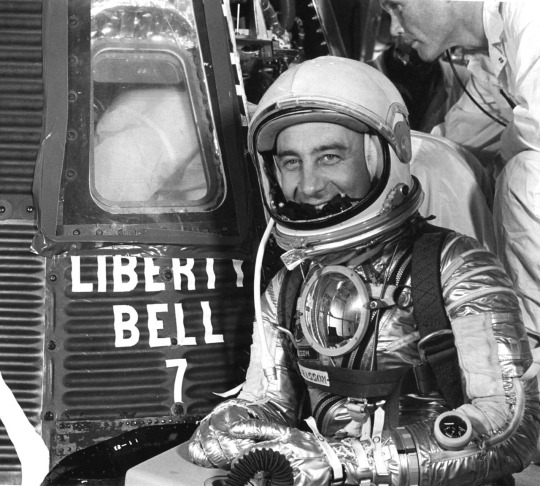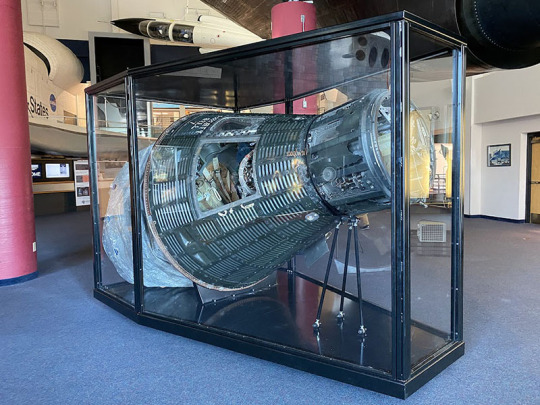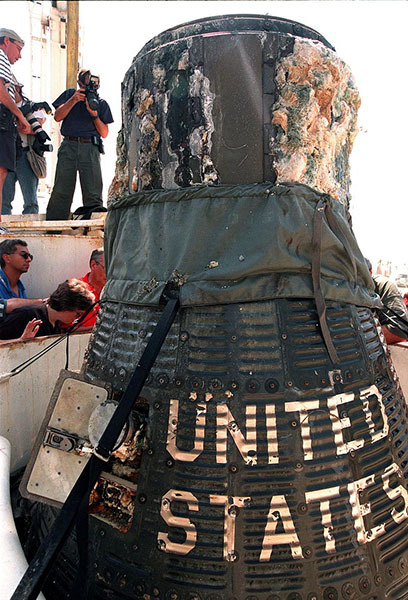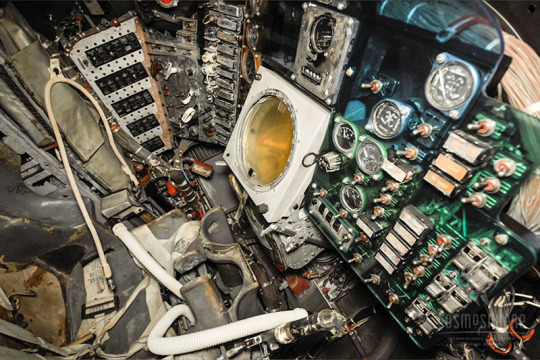#mercury program
Explore tagged Tumblr posts
Text

Reentry
62 years ago today on May 15, 1963, astronaut Gordon Cooper lifted off in the Faith 7 capsule on the final mission of the Mercury program, Mercury-Atlas 9. Faith 7 now hangs in a gallery at Space Center Houston, where I shot this photo. The effect was achieved by zooming while shooting at a slow shutter speed, handheld, Nikon D90, 18-200.
#photographer#photography#original photographers#photographers on tumblr#pws photos worth seeing#imiging#color photography#nasa#gordon cooper#faith 7#mercury-atlas 9#mercury program#astronaut#space#space capsule#space program#orbit#orbital#project mercury#houston space center#space center houston
100 notes
·
View notes
Text



The Mercury-Atlas 6 (MA-6) Friendship 7 capsule on top of its booster rocket with catwalk still attached.
Date: February 20, 1962
NASA ID: S62-00380, KSC-LOD-62C-128, 62C-0128
#Mercury-Atlas 6#MA-6#Friendship 7#Mercury Spacecraft No. 13#Mercury#Mercury Program#Project Mercury#NASA#Atlas#Atlas LV-3B#Atlas-109D#Rocket#LC-14#Cape Canaveral#Kennedy Space Center#Florida#February#1962#my post
92 notes
·
View notes
Text







Some detail photos of Sigma 7 and Gemini IX-A
119 notes
·
View notes
Text

Position Description for Mercury Astronaut
Record Group 255: Records of the National Aeronautics and Space AdministrationSeries: Reference Files of the Special Assistant
[underline] SS - 6.3 [/underline] [Stamped: Space Task Group] B
NATIONAL AERONAUTICS AND SPACE ADMINISTRATION
1520 H STREET NORTHWEST
WASHINGTON 25, D.C.
TELEPHONE: EXecutive 3-3260, TW: WA 755
IN REPLY REFER TO -
[Stamped: RECEIVED NASA SPACE TASK GROUP JUN 19 2 01PM '59]
[manuscript] 3
[underline] S S- 6.3 [/underline]
SO-14
SP - 2.6 [/manuscript]
Lt. Paul P. Bennett, Jr.
BuPers - A3122
Arlington Annex, Rm. 2603
Washington 25, D. C.
Dear Lt. Bennett:
In accordance with our telephone conversation of June 15 the following is a resume of the position description for the Mercury Astronauts.
[underline] Position Title [/underline]: Mercury Astronaut
[underline] Duties [/underline]: Participates in indoctrination, developmental research, and pre-flight training programs under conditions simulating flight profiles of the type expected to be encountered with Project Mercury. Operates and/or observes fixed-base and moving-base simulator tests, serves as subject-under-test, and assists in the analysis of data for the evaluation and development of various boosters and of communication telemetry, display, vehicle-contol, envirornmental-control and other systems involved in launch, atmospheric escape, orbital flight, re-entry, landing and recovery. Participates in specialized training exercises such as centrifuge programs to build up tolerances to motions and forces associated with launch, flight without gravity, and atmospheric reentry, and to develop proficiency and confidence for vehicle operation under such conditions.
Sincerely yours,
/s/
Clotaire Wood
Technical Assistant to the Deputy Administrator
[Stamped Routing List]
BLAND
BOND
DONLAN
FAGET
GILRUTH
HAMMACK
JOHNSON [initialed: lwj]
KRAFT
KYLE
MacDOUGALL
MATHEWS
MAYER
MEYER
PRESTON
PURSER
RICKER
[strikethrough] TAYLOR [/strikethrough] [initialed: G]
ZAVASKY
ZIMMERMAN
AERO MED [initialed: HBf]
[initials: ATS]
SPACE FILES
[manuscript] COPIES TO:
SHEPARD
SCHIRRA
CARPENTER
GLENN
#archivesgov#june 17#1959#astronauts#nasa#mercury program#mercury astronauts#space#space exploration
67 notes
·
View notes
Text
someone needs to make a community for all of us nasa freaks
13 notes
·
View notes
Text
God so @literallymechanical told me about this the other day and I'm still laughing about it. So, Gus Grissom was a one of the original seven Project Mercury astronauts, and was actually the second American to go to space, and the second American to go to space twice. He was also a short king but we'll get to that in a bit. Here he is with the Mercury-Redstone 4 capsule, nicknamed the Liberty Bell 7!

Mercury-Redstone 4 was the second US manned spaceflight, and there were some complications after its splashdown in the Atlantic ocean when the emergency explosive bolts unexpectedly fired, opening the hatch and flooding the thing. Our boy Gus had to tread water in his spacesuit while he waited for rescue, nearly drowning the entire time. The Liberty Bell 7 couldn't be retrieved, and is currently at the bottom of the ocean.
When Gus was selected as the pilot for the first manned Gemini flight, he became heavily involved in the design of the spacecraft cockpit. He also happened to be the shortest of the original astronauts at 5'7" tall. Literally, after he was done with it, 14 out of the 16 existing astronauts could not fit inside. They had to completely change the cockpit design for future missions.
NASA didn't learn its lesson about Gus and decisions, so they let Gus give his Gemini capsule a nickname, and it went about as well as you'd expect. This is the excerpt from his Wikipedia article (image description in alt text):

Fucking hilarious. There's a specific brand of humor you see in the early US space program that I just adore. It’s a phenomenal mix of like, 60's dry military humor (all these guys were airforce pilots), and the sheer incredulity of doing something as insane as going to space. Sometimes, you just gotta laugh and name your dinky little space car after the Titanic, because the first one fucking SANK IN THE OCEAN.
221 notes
·
View notes
Text
WitchCury!!!

and… LGTB+cury


#Lol#mercury program#Mercury‼️🔥#Witch :]|#lmao#solarballs fandom#solarballs#solarballs mercury#xd#genderfluid#Omg he Isss GAY 😫😫😫🔥‼️#u-u#Witch mercury save me#Mercury >>>>#fanart#it is NOT Krita ‼️#Is ibis paint#ibispaintx#ibispaint art#ibispaintdrawing#made in ibis paint#My kid 🥺#:00000#happy halloweeeeeeen#happy halloween#but in peru don’t celebrated hallowen but… Happy Hallowen 🎃🎃🎃
46 notes
·
View notes
Text

16 May 1963: Navy frogmen deploy from a hovering helicopter to begin the recovery process of the Mercury-Atlas 9 "Faith 7" capsule, with Gordon Cooper on board. Faith 7 landed just four miles (6 km) from the prime recovery ship, the carrier USS Kearsarge – the most accurate Mercury landing to date. The capsule came down in the Pacific, 80 miles (130 km) southeast of Midway Island. Splashdown was at 34 hours 19 minutes 49 seconds after liftoff.
25 notes
·
View notes
Text






Liberty Bell 7 – Scientist of the Day
Liberty Bell 7, a space capsule, was launched atop a Mercury-Redstone 4 rocket, on July 21, 1961.
read more...
#Liberty Bell 7#spacecraft#Mercury program#Cosmosphere#histsci#histSTM#20th century#history of science#Ashworth#Scientist of the Day
19 notes
·
View notes
Text

Credit to the owner
1 note
·
View note
Text

"Aerial view of Launch Complex 14 with Missile Row visible to the right. Mercury-Atlas 9, visible on Pad 14, was being prepared to carry astronaut Gordon Cooper for the fourth manned orbital mission."
Date: May 7, 1963
NASA ID: KSC-63PC-0034
#Mercury-Atlas 9#MA-9#Faith 7#Mercury Spacecraft No. 20#Atlas D#Atlas LV-3B#Atlas#Atlas-130D#Rocket#NASA#Mercury Program#Project Mercury#Mercury#LC-14#Cape Canaveral#Kennedy Space Center#KSC#Florida#Gordon Cooper#Leroy Gordon Cooper Jr.#May#1963#my post
62 notes
·
View notes
Text





The final flight of the Mercury program, Mercury-Atlas 9, launched on this day in history in 1963. Carrying L. Gordon "Gordo" Cooper aboard the spacecraft Faith 7, the flight was a 34-hour marathon test of the endurance of both man and spacecraft.
46 notes
·
View notes
Photo
Art by Davis Meltzer.

Flying solo, duo & trio via a little, medium & big rocket. The 3 spacecraft & relative rockets of Project Mercury, Gemini & Apollo. The 3 spacecraft were used between 1961-72 during the space race. The Mercury capsule carried food, water & O2 supplies for about a day. Project Gemini was the 1st to use Houston for Mission Control. Astronaut Gus Grissom was involved so heavily in the design that the other Original 7 astronauts nicknamed it the ‘Gusmobile’. It measured 18 feet, 5 inches long & 10 feet wide; not a lot of room for 2 people! The Apollo Program used the 363-foot tall Saturn V rocket with the Command (Control Center)/Service (unpressurized) & Lunar Module perched on top, pointed straight at the moon!
#davis meltzer#spaceflight#spacecraft#realistic space ship#atlas#titan ii#saturn v#mercury program#gemini program#apollo program#space capsule#command module#service module#lunar lander#astronaut#nasa
366 notes
·
View notes
Text

The vehicles used by REAL astronauts, not some rich space tourist wearing a f*****g cowboy hat.
545 notes
·
View notes
